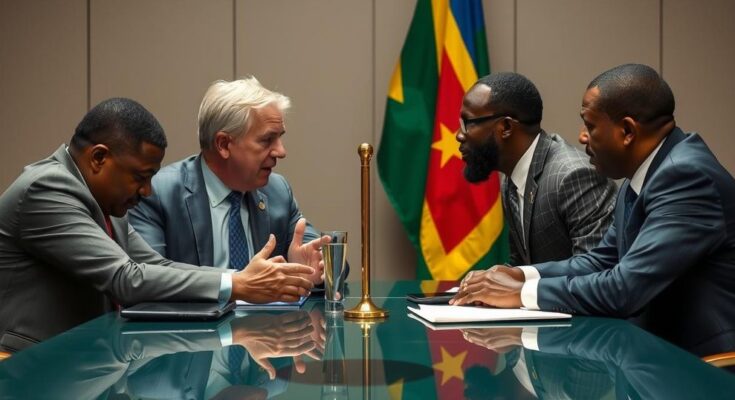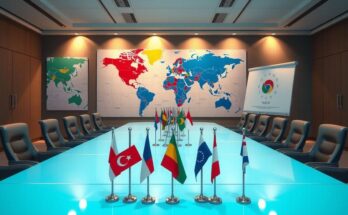Mozambique is currently facing a political crisis following disputed elections won by Daniel Chapo of Frelimo. Mediation efforts led by South Africa seek to address escalating tensions after protests erupted against alleged electoral fraud. Analysts suggest a transparent recount and power-sharing as potential solutions, although skepticism regarding the judiciary’s impartiality remains. Socioeconomic challenges further complicate the political landscape.
As Mozambique grapples with a significant political crisis, the potential for resolution appears to rest on mediation from regional stakeholders, with South Africa now positioned as a key negotiator. Following a failed attempt by the Southern African Development Community (SADC) to initiate dialogue, South Africa’s ministers have convened discussions with their Mozambican counterparts in Malelane. This follows the announcement in October that the ruling party’s candidate, Daniel Chapo, won the controversial election with 71% of the vote, a result opposed by opposition leader Venancio Mondlane, who alleged extensive electoral malpractice. The unrest, which began in late October, has claimed over 110 lives amid protests against the government’s use of force against demonstrators. Observers have called for a transparent vote recount and a power-sharing agreement, referencing similar resolutions in Zimbabwe and Kenya. However, concerns remain regarding the impartiality of Mozambique’s judiciary, with a crucial ruling from the Constitutional Council on December 23 expected to either escalate or de-escalate tensions. Analysts note that systemic issues like unemployment and public service inadequacies are also driving public discontent, reflecting a broader trend in Southern Africa where long-ruling parties face waning support among their constituencies.
The political crisis in Mozambique emerged after the election of Daniel Chapo from the ruling Mozambique Liberation Front (Frelimo), amidst allegations of election fraud by his opponent Venancio Mondlane. Protests erupted soon after the elections, resulting in significant violence and deaths, prompting calls for mediation from regional actors. The current mediation efforts by South Africa come after a lack of progress from the SADC. Observers are now looking for solutions similar to past power-sharing agreements in Africa. The upcoming ruling from the Constitutional Council on the election results is crucial for the country’s political stability, particularly given the public’s wariness of the objectivity of governmental institutions. Additionally, ongoing socioeconomic struggles fuel public support for the opposition, indicating potential for continued unrest if issues are not addressed.
In summary, Mozambique’s political landscape is precariously balanced, with mediation from South Africa offering a possible path toward resolution. A transparent recount of the elections and potential power-sharing arrangements could alleviate some tension. However, institutional trust remains a significant hurdle, and the outcome of the Constitutional Council’s ruling will be instrumental in determining the next phase of Mozambique’s political journey. The persistent socioeconomic challenges also highlight the complexities of the situation, underscoring the need for comprehensive reforms.
Original Source: www.aa.com.tr




